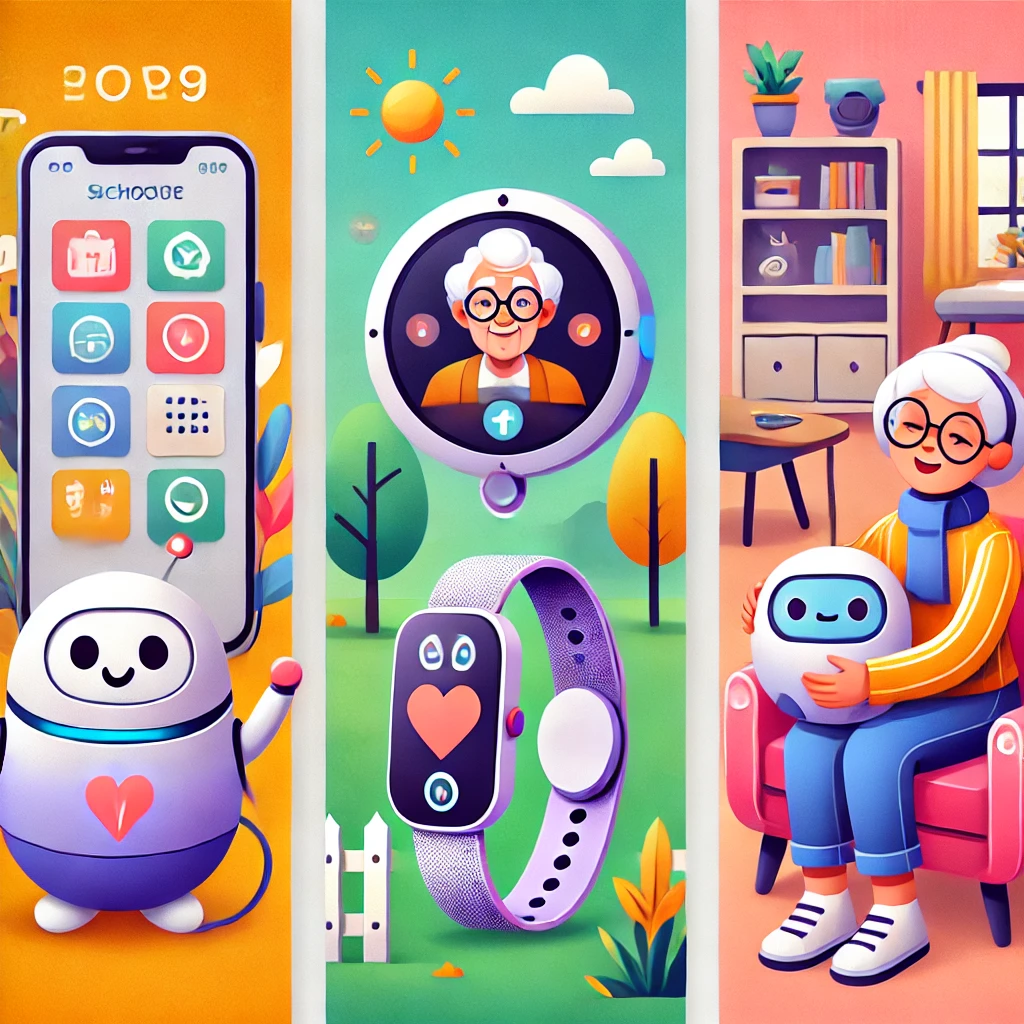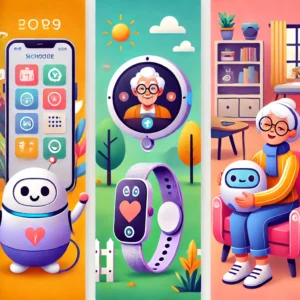Assistive Technology for People Living with Dementia at home

Assistive Technologies for Dementia: Tools That Help at Home

Living with dementia brings many challenges. Yet, modern tools offer real help. Assistive technologies for dementia are making life easier for those living at home. These smart tools can support memory, safety, daily tasks, and much more.
By using these devices, people with dementia can stay independent for longer. Their carers also get peace of mind. Let’s explore how these hidden gems are changing home care for the better.
How Assistive Technologies for Dementia Make a Difference
As dementia progresses, daily tasks become harder. Remembering names, times, or even finding the way home can be difficult. This is where assistive technologies for dementia can help.
They support the person, not replace them. These tools help people feel more in control. They also reduce stress and improve well-being.
Let’s look at the key benefits:
- Help people stay safe
- Reduce confusion and wandering
- Support memory and reminders
- Offer fun and mental engagement
- Make communication easier
- Give carers timely alerts
- Reduce the need for full-time care
Using the right mix of devices can make daily life smoother. Below are the types of tools that help.
Digital technology to support people living with dementia
Smart Memory Aids Support Daily Life for Dementia Patients

Memory loss is one of the most common signs of dementia. It affects appointments, routines, and even simple things like taking medicine. Thankfully, there are tools to support memory.
Digital Calendars and Reminder Apps
Many people use smartphone calendars. For dementia, special reminder apps can help. They can speak reminders aloud. They also give gentle prompts for tasks.
Some devices show the day, date, and even weather. These help reduce confusion and anxiety.
Voice-Activated Assistants
Smart speakers like Alexa or Google Assistant can help people stay on track. Just by asking, the person can:
- Hear the day and time
- Get reminders to take pills
- Play music from their youth
- Turn on the lights or heat
These voice tools work well for people who struggle with buttons.
Location Devices Keep People Safe
Wandering is a real risk in dementia. People may forget where they are or try to go somewhere alone. This can cause worry and danger. But some tools help carers keep track.
GPS Trackers
Tiny GPS trackers can be placed in shoes, watches, or pockets. If someone wanders, carers can find them quickly. Some apps also send alerts if the person leaves a safe area.
Wearable Devices With Boundaries
Smartwatches and pendants can alert carers when someone steps outside set zones. This gives freedom while keeping safety in mind.

Monitoring Tools for Peace of Mind
Living alone or being unsupervised, even briefly, can be risky. Small gadgets can now watch for changes and send alerts.
Home Sensors and Cameras
Motion sensors and smart cameras spot odd behaviour. If someone does not get out of bed by a set time, an alert goes to the carer.
If a door opens late at night, a notification is sent. These tools help carers check in without being there all the time.
Fall Detection Tools
Falls are a major concern. Wearable sensors can detect sudden drops and alert carers. This means faster help if someone falls and cannot call out.
Medication Tools Prevent Mistakes
Many people with dementia forget to take their pills. Some take the wrong dose or mix up medications. This can be dangerous. Thankfully, tools can help.
Smart Pill Dispensers
Automated pill boxes give the right pill at the right time. They can beep or flash to remind the person to take them. If missed, the carer gets a message.
Apps With Medication Reminders
Some apps link to pill schedules and alert both the user and the carer. These apps also track doses, which can be useful for doctors, too.
Fun and Brain-Stimulating Apps
Mental activity can slow the decline in dementia. Using simple games, stories, and music apps can make a big difference.
Puzzle and Game Apps
Many apps are made just for dementia. They include matching games, easy puzzles, and memory boosters. These apps can be adjusted for the person’s level.
Digital Photo Albums
Electronic memory books show photos and stories. These tools help spark memories and start conversations. They are helpful when words are hard to find.
Door Locks and Home Safety Tools
Simple tools can stop accidents at home. They also give carers more control without needing to watch every move.
Safety Locks and Alarms
Stove guards, window locks, and door alarms help stop unsafe actions. If someone tries to leave at night, a sound or message will alert the carer.
Smart Lighting and Sensors
Motion lights help people move safely in the dark. Smart sensors can turn lights on and off as needed. This reduces falls and confusion.
Staying Connected With Telehealth
Access to doctors and nurses is vital. But trips can be tiring. Telehealth makes it easier to get help. (depends on the country)
Video Consultations
Apps now allow video chats with health professionals. This saves time and energy. Carers can join the call to ask questions too.
Remote Monitoring Tools
Some devices can send health data straight to the doctor. For example, heart rate, sleep, and activity levels. This gives real-time insights.
Why Personalisation Is Key
Not every tool works for every person. Dementia affects people in different ways. What helps one person may confuse another.
That’s why it’s important to match the tool to the user. Some prefer touchscreens. Others may only respond to voice. Culture, language, and past habits all play a part.
Do a Simple Assessment First
Before buying gadgets, assess what the person needs and what they can still do. Ask questions like:
- Can they understand voice commands?
- Do they get upset by too much noise?
- Will they wear a pendant or tracker?
By answering these, you can choose the best fit.
Involving Carers and Loved Ones
Carers need to feel confident using these tools. If the tech is too tricky, it won’t help anyone.
Offer Training and Support
Make sure carers know how to set up and use devices. Many apps come with guides and support lines. Some local dementia groups even offer hands-on help.
Share Control
Some tools let family members track progress or join calls. This shared care reduces stress and keeps everyone involved.
Real-Life Example: John’s Story
John is 78 and in early-stage dementia. He lives alone, but his daughter checks in daily.
They set up:
- A digital clock showing the time and date
- A smart speaker that reminds him to eat and take pills
- A door sensor that sends alerts if he leaves late at night
- A GPS watch that shows where he is, if needed
These tools let John live on his own, safely and with dignity.
Challenges to Keep in Mind
While helpful, assistive technologies for dementia are not perfect. There are some challenges to be aware of:
- Devices can fail or lose power
- The Internet is needed for many tools
- Some people with dementia resist change
- Carers need time to learn the systems
Still, with planning and patience, most of these can be overcome.
The Future Looks Bright
New tools are being created all the time. From virtual reality to smart clothing, the future of assistive technologies for dementia is full of hope.
We may see tools that detect mood changes or help with speech loss. As more research is done, these aids will become smarter and more personal.
What Assistive Tech Works Best for Early-Stage Dementia?

People with early-stage dementia often still live independently. They may forget tasks or get slightly confused. At this stage, simple assistive technologies for dementia can make a huge difference.
Best Tools to Start With
Digital day clocks are helpful. They show the full date, time, and part of the day. This clears up time confusion.
Smart speakers like Alexa or Google Assistant are also useful. These voice tools respond to simple questions and can:
- Remind users to take medication
- Play calming or familiar music
- Tell the time or day when asked
Reminder apps or alarms on a phone can prompt meals, pills, or appointments. They’re easy to set and adjust.
Photo phones are great too. They allow users to call loved ones by pressing a photo instead of remembering numbers.
Why These Tools Help
These early tools are not overwhelming. They support memory gently without taking control away. They also work well for people who are used to smartphones or tablets.
With the right support, these tools help users stay active in their routines. They also build trust in tech use for the later stages.
Are GPS Trackers Safe and Private?
GPS trackers are often used to prevent wandering. But many people ask—are they safe and private?
The answer depends on the type of device and how it’s used. Still, most assistive technologies for dementia are designed with care and privacy in mind.
How GPS Trackers Work
Most GPS trackers are worn on the wrist, in a pendant, or in a shoe. They send location data to an app. If the person moves outside a set area, carers get an alert.
Some can also send out an SOS signal with a press of a button.
Safety Features
Good trackers offer secure logins. This means only approved carers or family members can see the location. The data is stored safely and not shared with anyone else.
Some also offer “geofencing”. This means setting a safe zone, like the home area. If the person leaves this space, alerts go out instantly.
Why Privacy Still Matters
Before using a tracker, always talk to the person with dementia. Get their agreement if possible. This respects their rights and dignity.
Let them know it’s for safety, not control. This builds trust and lowers anxiety.
In short, GPS trackers can be both safe and private when used with respect.
How Do I Get Help Setting Up Smart Devices?
Even simple assistive technologies for dementia can feel tricky to set up at first. The good news is that help is available.
Start With User Guides
Most devices come with clear manuals or online videos. These guide you step by step. Stickers and colour-coded buttons also help with setup.
Ask the Device Supplier
Many companies offer free phone support or live chat. They’ll walk you through the setup and give tips. Some even send someone out to help in person.
Use Local Dementia Services
Charities like Age UK or Alzheimer’s Society often run tech help sessions. Some areas have dementia cafés or support groups where carers share advice.
You can also:
- Ask your local council’s adult services
- Contact your GP for a tech referral
- Look for dementia-friendly community centres
Get Family and Friends Involved
Many carers find it easier to learn with support. Ask a family member or friend to help you test and install devices. Once set up, most tools run with little upkeep.
By taking one step at a time, setting up tech can be easy and stress-free.
Final Thoughts on Assistive Technologies for Dementia
Assistive technologies for dementia offer more than just tools—they offer hope. These gadgets support people to live at home safely, with dignity and purpose.
By picking the right mix of tools, people with dementia can enjoy more independence. Their carers also get the help they need.
Let’s continue to explore and embrace these innovations. Because with the right support, people with dementia can still live meaningful, connected lives at home.
“Get trusted advice on dementia care at home and practical tips for caring for someone with dementia at home—all in one place.”
